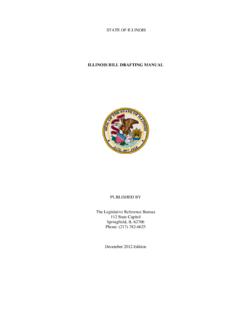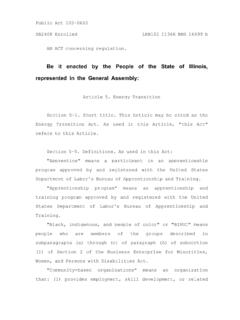Transcription of Illinois department of human services
1 Illinois department OF human SERVICES2019 TRAINING SEMINARLISA MCCLURECONSTITUENT BENEFITS Supplemental Nutrition Assistance Program Temporary Assistance for Needy Families Child Care Assistance Program Early Intervention Medical Assistance Qualified Medical BeneficiaryThe Supplemental Nutrition Assistance Program (SNAP) was formerly known as food stamps and helps low-income households buy the food they need for a nutritionally adequate are provided on the Illinois LINK Card an electronic card that is accepted at most grocery stores. The program is managed by the Food and Nutrition Service (FNS) of the United States department of Agriculture and administered by NUTRITION ASSISTANCE PROGRAME ligibility is dependent on a variety of factors, including: Income Expenses (housing, medical, etc.)
2 Number of people in the householdIndividuals apply by mail, in person at a local IDHS office, or online at is also a SNAP eligibility calculator on the IDHS website that will estimate eligibility and benefit NUTRITION ASSISTANCE PROGRAM (CONT.)Temporary Assistance for Needy Families (TANF) program provides temporary financial assistance for pregnant women and families with one or more dependent children to help pay for food, shelter, utilities, and expenses other than parent must work or be involved in either a work training program or educational studies. They must also develop and follow a Responsibility and services Plan (RSP).Cash assistance through TANF has a 5-year lifetime limit, with some ASSISTANCE FOR NEEDY FAMILIESE ligibility is dependent on a variety of factors, including: Being pregnant and/or having children under 18 Being a US citizen or meeting certain immigration requirements Living in Illinois IncomeIndividuals apply either in person at their local IDHS office or online at are issued through the Illinois LINK Card.
3 Those who qualify for TANF will also likely qualify for SNAP, medical, and the Child Care Assistance ASSISTANCE FOR NEEDY FAMILIES (CONT.)The Aid to the Aged, Blind, or Disabled (AABD) cash assistance program is for persons who are aged, blind, or disabled and who need money. A person may be eligible for AABD if they: Receive Supplemental Security Income (SSI) or are ineligible for SSI due to income or are ineligible for SSI due to expiration of federal time limit on assistance to certain immigrants who have not yet become citizens. Are a citizen or meet certain requirements for noncitizens Live in Illinois Are 65 years or older, blind, or disabledWhen determining eligibility for AABD, the department exempts certain assets up to a specific dollar amount.
4 AID TO THE AGED, BLIND, AND DISABLEDSNAP, TANF, and AABD cash are accessed via a LINK card which works like a debit card. LINK card customers can find out information about their account(s) by calling 1-800-678-LINK (5465).The hotline can assist them with: Checking the balance on the card Determining when the next reload will occur Learning when their next recertification is dueLINK CARDThe Child Care Assistance Program (CCAP) provides low-income, working families with access to affordable, quality child care that allows them to continue working and contributes to the healthy, emotional, and social development of the child. CCAP can help families pay for care in center-based or home settings. Families are required to cost-share on a sliding scale based on family size and CARE ASSISTANCE PROGRAMTo qualify for the program an applicant must: Live in Illinois Be employed and/or going to an eligible educational activity (high school, trade school, undergraduate ) Have children younger than 13(children with documented special needs may be eligible up to the age of 19) Have family income below allowable limits Individuals can apply either online at the IDHS website or via a paper application.
5 CHILD CARE ASSISTANCE PROGRAM (CONT.)Early Intervention (EI) is a program to help young children with disabilities or delays learn and grow. Families with an infant or toddler from birth to 3 years old may be and toddlers are evaluated to see if there is a delay in movement, learning, dealing with others, behavior, and/or self-help services are needed, an Individualized Family Service Plan (IFSP) will be written to set goals and identify apply, interested families should Use the IDHS Office Locator to find an Early Intervention Child and Family Connections office in their local INTERVENTIONW hile medical programs are administered through the Illinois department of Healthcare and Family services (HFS), the public may apply for medical assistance at their Illinois department of human services Local Office.
6 They may use the IDHS Office Locator on our website to find their nearest local office or at qualify for medical assistance a person must meet financial eligibility and residency ASSISTANCE Hospital care Nursing facility care Supportive living care Doctor services Prescription drugs Audiology services Care at clinics Renal dialysis Laboratory tests and x-rays Eye care Dental care (limited services for adults)MEDICAL ASSISTANCEThe following medical services are covered by any medical providers who accept Illinois Medicaid: Medical transportation Hospice care Home health care services Physical, occupational and speech therapy Family planning Medial equipment, supplies and appliances Podiatry care Help for alcohol and substance abuse Chiropractic care Shots and check-ups for children Mental health careMEDICAL ASSISTANCE ACA ADULTS Under the Affordable Care Act (ACA), adults age 19-64 who were not previously eligible for coverage under Medicaid can now receive medical coverage through Illinois Medicaid.
7 Eligibility is determined by income and the number of members in a household. MEDICAL ASSISTANCE AABD Aid to Aged Blind and Disabled (AABD) Medical covers seniors, persons who are blind, and persons with disabilities. Medicare is the primary insurance provider for constituents who qualify for Illinois Medicaid under AABD. MEDICAL ASSISTANCE LONG TERM CARE Long Term Care (LTC) Medicaid covers those who live in a long-term-care nursing facility. Eligibility for LTC is determined by IDHS. Determining eligibility for LTC care may require substantial documentation. The most commonly requested verifications to determine LTC eligibility are bank statements, insurance policies, and transfers of income or assets.
8 MEDICAL ASSISTANCE SPENDDOWN Spenddown (SPD) Medicaid allows access to IL Medicaid for constituents who are in the AABD category, but whose income is over the income standard to qualify for regular AABD IL Medicaid. Spenddown works similar to an insurance deductible. The deductible amount is determined by the amount of income one has over the income standard of $1,041, less a $25 income disregard. Example:For a household of one whose income is $1075, the spenddown deductible would be $9. ($1075 -$1041 -$25 = $9) MEDICAL ASSISTANCE MEDICARE SAVING PROGRAM The Medicare Savings Program (MSP) is a Medicaid program that can help to pay Medicare premiums and possibly deductibles and co-insurance for Medicare beneficiaries.
9 There are three MSP programs; what MSP program a constituent qualifies for is determined by household income. TheQualified Medicare Beneficiary (QMB) pays Part A & B Premiums, deductibles, and coinsurance. The Specified Low Income Medicare Beneficiary (SLIB) program pays Part B premiums. The Qualified Individual (QI) program also pays Part B premiums. Low-income individuals who are eligible for the Qualified Medicare Beneficiary (QMB)program are entitled to have the State of Illinois pay their Medicare-related charges including: Deductibles Premiums Coinsurance charges Coinsurance for extended hospital stays and skilled nursing facilities Cost of additional health services may be covered by Medicaid if the individual qualifiesThere are income and resource limits for QMB.
10 Individuals can apply either at a local IDHS office or online at MEDICARE BENEFITS ANGELA O NEALCONSTITUENT Rehabilitation services Mental Health services Substance Use services Developmental Disability ServicesIDHS Division of Rehabilitation services (DRS) is the state s lead agency serving persons with physical disabilities to empower them to reach their employment, education, and independent living goals. DRS has 46 local offices throughout Illinois that can be found using the office locator on the IDHS website and assist in coordinating services such as: The Home services Program (HSP) Vocational Rehab Educational and Specialized services Independent Living Disability Determination Client Assistance Program Information and ReferralREHABILITATION SERVICESB ureau of Disability Determination ServicesThe Social Security Administration (SSA) program provides benefits to persons with severe disabilities whose impairments prevent them from performing gainful work.








